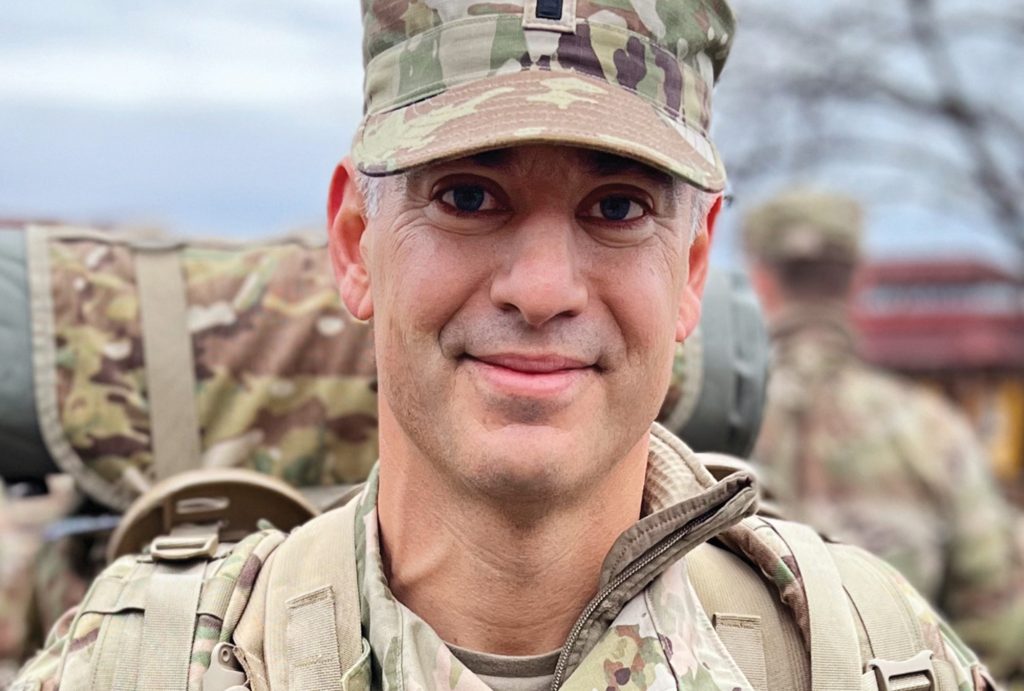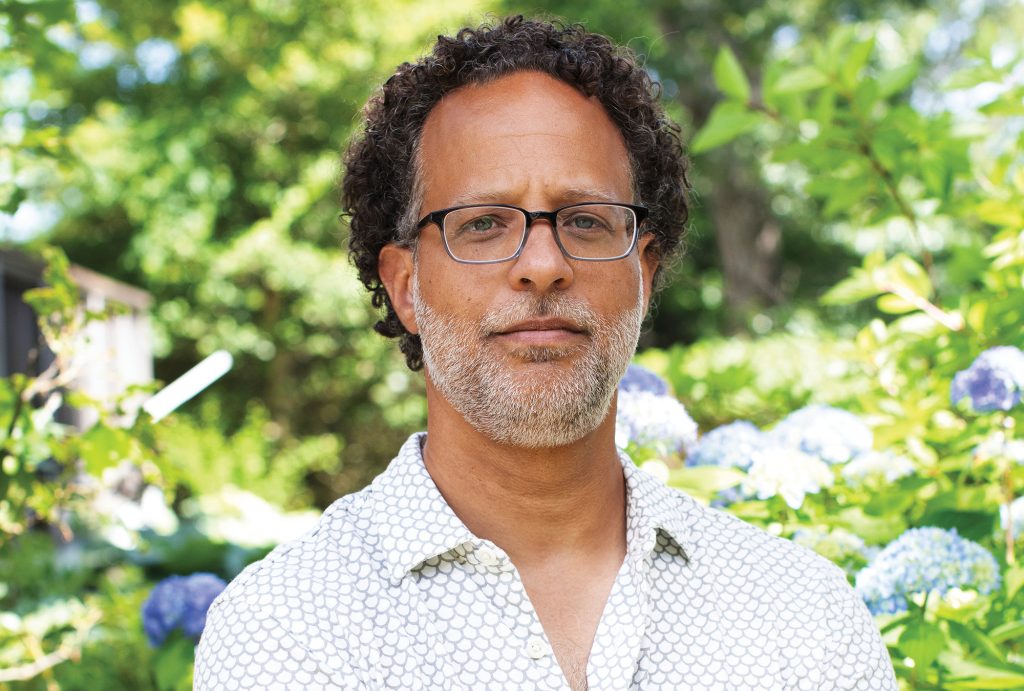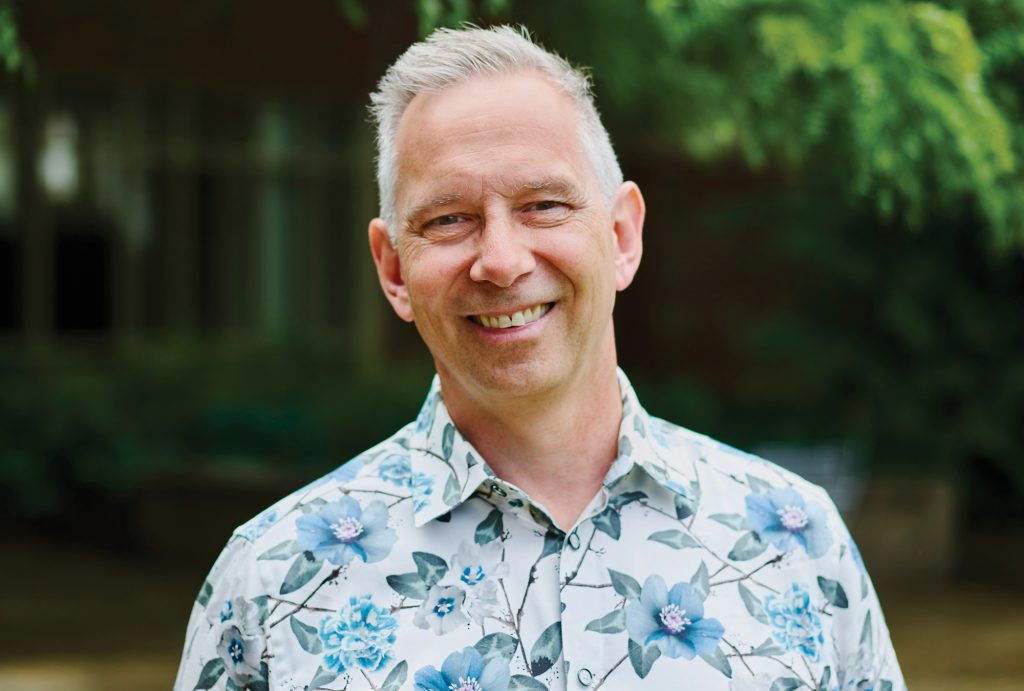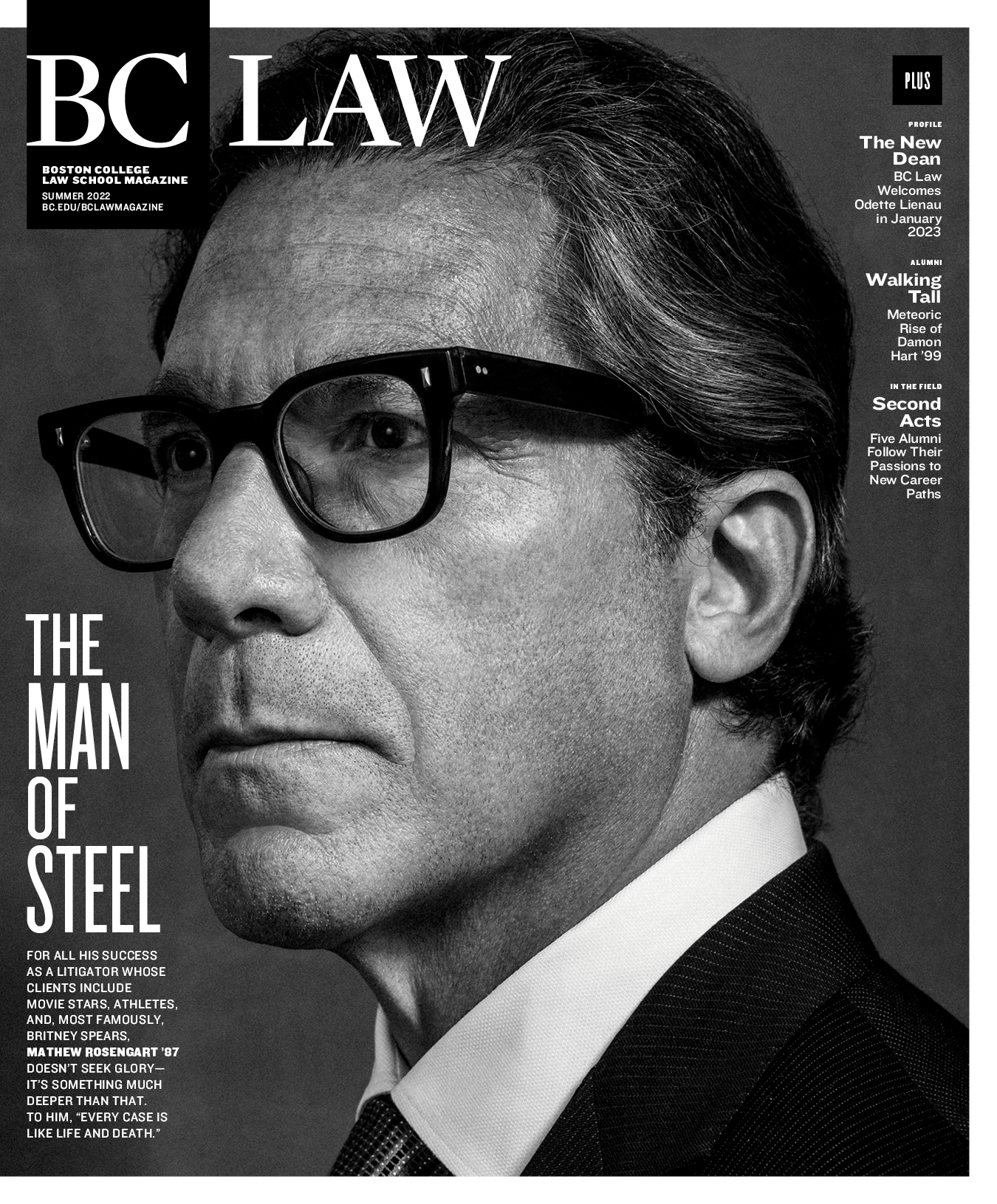For most Boston College Law School graduates, an Act One practicing law is a dream come true. From firms to corporate suites to public interest and government jobs, law provides a stimulating and energizing vocation. But for some graduates, unanticipated plot twists and turns lead to Second Acts. “I always had a huge drive to be creative,” says Siobhan Beasley ’08, who gave up law practice in 2012 and then found her way to a career as an award-winning fashion and advertising photographer. “I think I had a notion that you could do art as a hobby but not for work. It never felt like I had a choice until I made the choice.”
Beasley, like so many others, was confronted in 2020 with the ultimate intermission when the Covid-19 pandemic took center stage. But, like every well-trained BC Law graduate, Beasley knew how to improvise. So, together with a good friend, she launched SaintBeasley.com, an online shop featuring Beasley’s bold, vibrant, sometimes cheeky images as professionally printed and framed wall decor and biodegradable iPhone cases. You might say that SaintBeasley.com is a Third Act for the one-time human rights lawyer. Or, maybe it’s simply an extension of the script Beasley has been ad-libbing since the days when she realized practicing law was not a fit.
Indeed, it took Beasley several years to find her career path. As a law student, she eagerly accepted an internship with the United Nations International Criminal Tribunal for the former Yugoslavia, which led to a full-time, post-graduate job as a prosecutor in The Hague. “At the war crimes tribunal, I was grateful to have the experience, but I kept getting this sinking feeling that it wasn’t a good fit.” Again and again, she felt herself pulled to more artistic pursuits, so she decided to quit the law and follow her passion.
“I’ve been doing photography for hire for almost ten years and there’s never been a day I regret leaving law because this is a better fit for me,” explains Beasley, who is now based in Norway but frequently shoots in Boston. “I didn’t see it coming but I’m really happy and really grateful.”
But Beasley has no regrets about attending law school. “Learning the law forces you to think incredibly logically,” she explains. “I can pick through an argument, being able to see what is true and what isn’t and how to work through it logically. I feel very grateful for that education.”
“I’ve been doing photography for hire for almost ten years and there’s never been a day I regret leaving law because this is a better fit for me.”
Siobhan Beasley ’08

Jon Brooks ’99 has thoroughly enjoyed his career as a corporate attorney specializing in mergers and acquisitions. But for now, he’s following his dream. “I always wanted to serve in the military,” explains Brooks, who is forty-nine. “It was a continuous feeling that we are so fortunate as Americans to live in this country and to have the opportunities we have—and to pursue a legal career in my case—and I feel all of this was enabled by the people in uniform. I felt I would be a better person if I served a small part in that.”
About five years ago, Brooks heard that the Army offered age waivers for those beyond the typical thirty-something age limit for signing up, so he put in an application. In 2021, he cleared waivers to serve in the US Army Judge Advocate General’s Corps (JAG Corps) and by early 2022 he was on his way to Fort Benning in Georgia as a member of the US Army Reserves, JAG Corps. After finishing a six-week officer basic skills course, including how to shoot a rifle and the steps to a proper salute, he headed to military law school at the University of Virginia campus last spring.
“In JAG training, you learn about court-martials, military criminal law, national security law, administrative law, fiscal law, and more,” explains Brooks, who is now a First Lieutenant. “Physical fitness is also a large part of the experience, so I had to train hard before coming to basic training as I am more than twice the age of some of my fellow soldiers.”
Brooks’s decision to enter the military wouldn’t have been possible without the support of his wife. “We have three young children, so my wife and I had a lot of conversations about this path. I was away from home four months for training, and I’ll be gone one weekend a month and two weeks a year from now on,” he explains. “But my experience so far has been completely validating—the same things that are valued when I was at BC Law and in the private sector are the same things I value in the military: selfless service, focus on the greater good, treating everyone with integrity.”
That’s why Brooks was so thrilled when he discovered two other BC Law graduates, Anthony “Tony” Rizzo ’15 and Griffin Pardales ’21, in his basic JAG officer class. “I saw them as a testament to BC Law’s culture of service,” he says.
As a member of the JAG Corps, Brooks’s duties will include assisting soldiers with legal needs and helping them navigate any legal troubles. “The JAG Corps bills itself as the world’s largest law firm, so I’ll be handling a wide range of legal matters,” he says. “Most importantly, I’ll directly impact the lives of soldiers.”
While Brooks wishes he had entered service earlier in his life, he is thrilled to be wearing the uniform now. “This has taught me that it’s never too late to try for your passion. Just because you didn’t do something earlier in life, don’t assume it’s not an option for you now,” he says. “The Army isn’t my second career, it’s my first calling.”
“This has taught me that it’s never too late to try for your passion. Just because you didn’t do something earlier in life, don’t assume it’s not an option for you now.”
Jon Brooks ’99

Eric Van Allen ’99 couldn’t agree more. He uses his law degree every day as the proprietor of The Inn at Shearer Cottage on Martha’s Vineyard—founded by his great-great-grandparents in 1912 as a destination for African Americans, who were not welcome at other island establishments at the time.
“I think lawyers can sometimes forget or possibly take for granted the wide ranging and valuable skills they have acquired not only in law school but also in their day-to-day law practice, and how much they understand about the world around them and how it works,” he explains. “My BC Law education taught me how to navigate the world around me and, most importantly, how to advocate for myself. This gives me a lot of confidence.”
Up until Covid hit, Van Allen had spent a decade in increasingly senior legal positions. After law school, he went to work as senior counsel with the US Securities and Exchange Commission. From there, he moved on to the American Stock Exchange and to Morgan Stanley, where he spent a decade in director-level positions in New York and London.
When he and his family left London, he returned to New York to serve as vice president for compliance for Brown Brothers Harriman and then as executive director of compliance and operational risk control for UBS Asset Management. “As I got more senior, the work was less about the things I enjoyed doing and felt more about budgeting and headcounts. Only when the pandemic changed the world, did I really sit down and think about what I wanted to do,” Van Allen says.
“My mother had been running the inn for more than twenty years when the pandemic hit, and before her, my grandmother and her sister ran it and my great-great-aunt before them,” he explains. “I wanted more control over my life, and I had enough resources to take a break. I had this really special family legacy that deserved to be invested in, so I discussed my ideas with my mother and wrote a business plan to renovate and expand the inn.”
These days, Van Allen is knee-deep in zoning permits and construction. “If you’re scared about your second act, you should really analyze your fears. It just takes planning,” says Van Allen. “You can survive on a lot less than you think you can. I changed my lifestyle to make sure I could do this.”
“I wanted more control over my life, and I had enough resources to take a break. I had this really special family legacy that deserved to be invested in, so I discussed my ideas with my mother and wrote a business plan to renovate and expand the inn.”
Eric Van Allen ’99

For Steven Levy ’22 the sense of urgency to make the world a better place put him on the path to law school as his Second Act. A highly successful entrepreneur, Levy went to MIT in the 1980s and then launched a business that focused on creating software for asset managers. Fifteen years later, he sold that business and went on to fill a handful of CEO roles before he decided that the things he really wanted to focus on were the structural barriers preventing the poor from working their way up in this country.
“My parents were refugees from Greece. My mom was an Auschwitz survivor, and my dad fought in the Greek civil war. They came to the United States in the 1950s with nothing,” explains Levy. “I got to the point where I looked at how much I had benefited from being in this country and wanted to make sure the US became a place where everyone who is willing to work hard has a chance to work their way to success.”
While Levy’s parents went on to achieve success in the residential and commercial real estate markets in Florida, he believes that the poor are now being cut off from opportunities. He wants to change that. “It’s still early, but the first step is to try to understand what are the biggest structural impediments to people doing what my parents did,” he says. “Then, I’ll survey what organizations are out there and how they are trying to fix parts of this problem.”
Levy is thinking about founding a new organization, perhaps modeled on the Southern Poverty Law Center, to combat structural discrimination suffered by those who live in poverty. “We are discriminating against the poor and I think there could be legal remedies to address those problems,” he says. “My hope is that we’ll be able to get the courts to treat poverty as a suspect class much in the same way they treat race.”
Levy hopes that his vision will prove transformative for our society. That’s a big Second Act—for Levy and for our country—and it will involve a good deal of risk and a willingness to change. But when it comes to Second Acts, it’s clear that passion must be the guiding force.
“It’s still early, but the first step is to try to understand what are the biggest structural impediments to people doing what my [immigrant] parents did. Then I’ll survey what organizations are out there and how they are trying to fix parts of this problem.”
Steven Levy ’22

Bianca Forde ’08 also felt a calling. After spending nearly a decade in litigation with big law firms including Dewey & LeBoeuf and Milbank, she joined the US Attorney’s Office in Washington, DC, in 2015. As an assistant US attorney, she investigated, indicted, and tried a wide variety of cases at the local and federal levels. What she discovered was a complex system with a disproportionately negative impact on people of color and the poor.
Unable to stay silent or to be the “pawn of a misguided system,” Forde wrote a book, Prosecuted Prosecutor: A Memoir & Blueprint for Prosecutor-led Criminal Justice Reform.
“I started writing my book during the pandemic,” Forde says. “It was something that was in my heart to write. I often woke up at 4:00 a.m. to write and then, after work, I would get back to it.”
In the book, Forde provides an authentic analysis of how prosecutors can truly fulfill their mandate as servants of the law. She candidly shares her evolution as a prosecutor to inspire both rookie and veteran prosecutors to think differently about prosecutorial power and disrupting the status quo. “My book really does fill a gaping hole in criminal justice literature. There are so many books and writers criticizing prosecutors without offering practical solutions, especially for line or trial prosecutors. My book conveys how prosecutors can inject equity into the system and acknowledge the humanity of the accused.”
While Forde’s passion for justice has spurred a second career as an author and speaker, she continues to practice law. In 2020, she joined Otis Elevator as senior director, counsel, and head of global investigations, and in 2021, she was promoted to senior director, counsel, and head of ethics and compliance for Otis Americas. People often ask Forde how she finds the time to balance what can feel like two careers.
“Our priorities govern what we do,” she explains. “A lot of people were surprised that I found the time to write a book during the pandemic, with a full-time demanding job, but there was an urgency within me that I could not ignore. If something is important enough to us, we make time for it.” When asked about her vision for her book, Forde says, “The book has already demonstrated the capacity to change hearts and minds. I want to see it incorporated into law school curricula and into prosecutorial training programs.” To those contemplating a Second Act, Forde advises staying true to yourself. “I really do think that when it comes to changing careers or any decision that can have an impact on our trajectory, personally or professionally, what we want and need can become overshadowed by outside noise,” she says. “My advice to anyone considering changing careers is to tune out the noise, get proximate to your own wants and desires, and embrace the journey.”
“I started writing my book during the pandemic. It was something that was in my heart to write. I often woke up at 4:00 a.m. to write and then, after work, I would get back to it.”
Bianca Forde ’08



